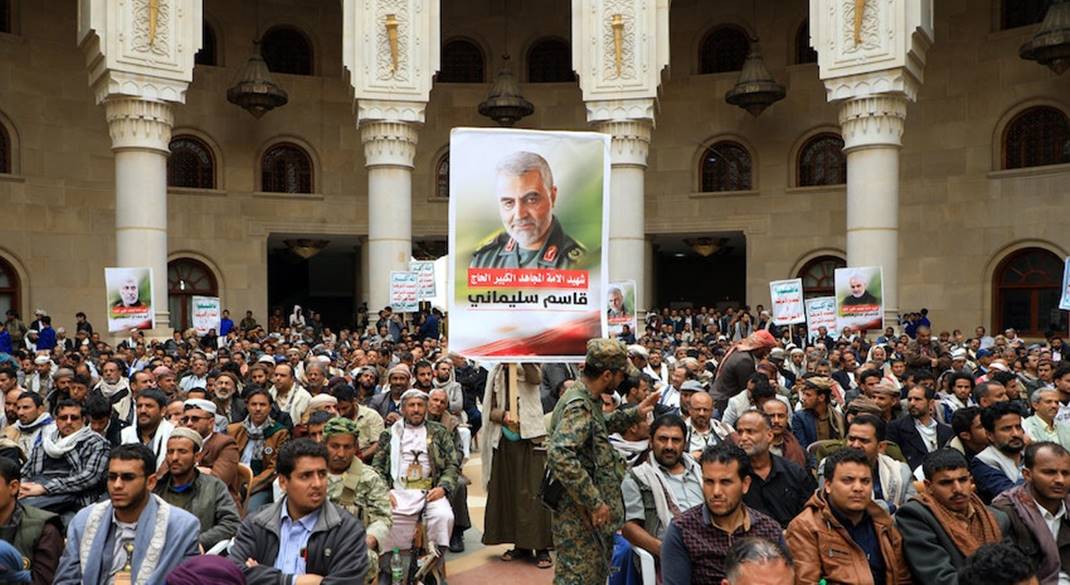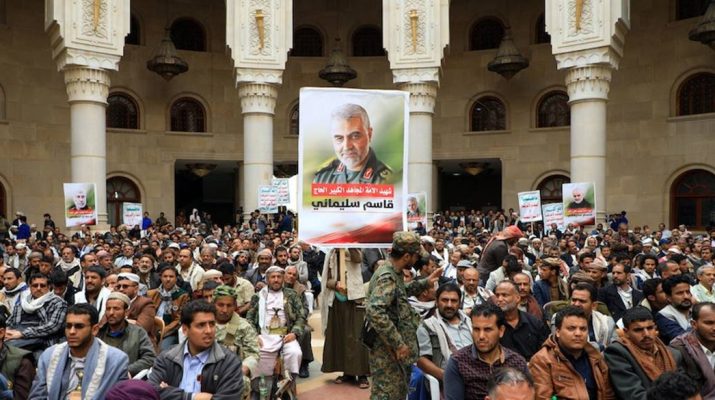Deep Dive: Houthis effectively declare war on Israel after drone, missile barrage

Yemen’s Ansarullah movement, better known as the Houthis, has effectively declared war on Israel. In a statement on Oct. 31, Houthi military spokesman Yahya Sarei said, “Our armed forces have launched a large batch of ballistic and cruise missiles and a large number of drones on various Israeli enemy targets in the occupied [Palestinian] territories.” Sarei described the attacks as supportive of Palestinians in Gaza who are facing “American-Israeli aggression” amid the “weakness of the official Arab regime[s] and the collusion of some with the Israeli enemy.”
Israeli media have reported that fighter jets shot down incoming drones while the Arrow air defense system intercepted a ballistic missile launched from the Red Sea area. Importantly, Sarei said the Oct. 31 attack is the third of its kind, claiming responsibility for other aerial strikes in recent days. The main target appears to be the southern Israeli city of Eilat.
The official entry of the Houthis into the Hamas-Israel conflict follows warnings from Iran that the Gaza war may trigger the “opening of new fronts.” Sarei confirmed this narrative, saying that what “expands the field of the conflict is the Zionist enemy’s continuing perpetration of crimes and massacres against the people of the Gaza Strip.”
The opening of a Yemeni front exposes Israel to further external attacks at a time when an all-out Israeli confrontation with Lebanon’s Hezbollah movement looms. A Houthi entry into the Gaza war may also come to engulf Gulf Arab states and the US, potentially unraveling the UN-mediated truce in Yemen.
Multiple motives
The effective Houthi declaration of war cements the Yemeni movement’s status as a member of the Iran-led ‘Axis of Resistance’. Of note, the Iran-led constellation also gathers Syria, Lebanon’s Hezbollah movement as well as armed groups in Iraq. At a time when the Arab public is outraged by the violence in Gaza, the Houthis may additionally be girding to build regional legitimacy after years of harsh criticism, particularly in Gulf Arab media.

Observers have also highlighted internal reasons for entering a conflict with Israel. Ibrahim Jalal, a non-resident scholar at the Middle East Institute, has argued that the Houthis have “four primary motives”: deflecting rising discontent with its governance, rallying support at home, boosting morale among its fighters, and “increasing leverage” in the ongoing peace talks with Saudi Arabia.
The political maneuvering by the Yemeni movement has been agile and swift. Only three days after the Palestinian Hamas movement’s Oct. 7 attack on Israel, Houthi leader Abdul-Malik Al-Houthi declared a readiness to enter the fray if the US directly intervenes in Gaza. Specifically, he warned that drones and “other military options” would be deployed in such a scenario. Notably, the Yemeni leader further asserted that there is “complete coordination” with other members of the ‘Axis of Resistance’. Mohammad Ali Al-Houthi, a prominent member of the Houthi-controlled Political Supreme Council, days later charged that an alleged request for Saudi Arabia to open its borders for Yemeni fighters to confront Israel had gone unanswered.
The Houthis on Oct. 20 launched their first aerial attack on Israel, deploying a number of drones and missiles over the Red Sea. That strike was thwarted by a US Navy destroyer. Reports later claimed that Saudi Arabia also downed at least one missile. Houthi attacks were also launched on Oct. 30, which Sarei has now effectively claimed responsibility for.
Fabian Hinz, a Research Fellow at the Institute for International Studies, said that for regional players who wish to target Israel, Yemen is the “perfect launchpad.” He told Amwaj. media, “From a political and strategic point of view, Yemen is fantastic [for the ‘Axis of Resistance’] as there is no risk of a [resulting] cataclysmic war as is the case in Lebanon.” Addressing the prospect of Israeli or US retaliatory airstrikes, he charged that such actions are not likely to deter the Houthis or Iran, saying, “They are used to that, as horrible as that sounds.”
An expert on Houthi drones and missiles, Hinz additionally argued that Yemen is also a “perfect launchpad” from a “technical point of view…as it’s very far away.” At the same time, he noted that Israel has “very, very good defenses against the types of systems that the Houthis have,” saying that the Yemeni movement will find it difficult to overwhelm Israeli defenses with the types of drones and missiles in its arsenal.
History of enmity
The Houthis have long been fiercely hostile towards Israel. This has not changed since the movement expelled Yemen’s internationally recognized government from Sana’a in 2014. As recently as April this year, the group’s top official described “the Zionist enemy” as an “eternal enemy for the Arab and Muslim nations.” Abdul-Malik Al-Houthi has also accused Tel Aviv of being involved in the Saudi-led military intervention in Yemen. In 2018, he charged that Israel had “participated” in the “aerial bombardment of the Yemeni coast.”
Two years later, in 2020, military spokesman Sarei claimed that former Yemeni president Ali Abdullah Saleh (1942-2017) had “high-level communication and coordination” with Israel and that Israeli delegations had been visiting the country since the 1990s. Sarei also alleged that in addition to security cooperation in the Red Sea and the Bab Al-Mandab strait, Saleh had entered discussions on allowing Israeli civil aviation to use Yemeni airspace.
Last year, the prime minister of the Houthi-led National Salvation Government, Abdulaziz bin Habtoor, said his cabinet was drafting a law “to criminalize normalization with Israel”—describing the measure as in line with “the path of the Axis of Resistance in defending Palestine.” Importantly, Habtoor also thundered that the ‘Axis of Resistance’ is “ready to bury Zionist dreams and all the normalizers with it.”
Observers view the rhetoric against “normalizers” as chiefly targeted at the UAE. When Abu Dhabi formalized relations with Tel Aviv under the 2020 Abraham Accords, the Houthis slammed the move as an attempt by Israel to “spy on Iran and establish a foothold near the Strait of Hormuz.” The UAE has also been in the crosshairs over its previous involvement in the Saudi-led war in Yemen. Those tensions remain for a variety of reasons, including Abu Dhabi’s influence over the Southern Transitional Council (STC) and the Giants Brigades.

Conflict in the Arabian Peninsula?
While a UN-brokered truce put in place last year has halted fighting with Saudi Arabia, the Houthis have kept a close eye on the US-backed efforts to normalize relations between Riyadh and Tel Aviv. The Yemeni movement may be seeking to increase its leverage at the negotiating table. However, with a permanent solution to the war in Yemen remaining absent, and the Kingdom potentially facing a situation where it may have to thwart attacks against Israel over its skies, there is a prospect for renewed conflict in the Arabian Peninsula.
Importantly, the Houthis have in the aftermath of the Hamas movement’s surprise attack on Israel earlier this month been explicit in their criticism of the UAE. On Oct. 9, top Houthi spokesman Mohammed Abdulsalam lashed out at Abu Dhabi over its alleged “backstabbing of the Palestinian resistance” and “public siding with Israel.” Abdulsalam insisted that the peoples of the region would not “tolerate any side which provides cover for Israel’s aggression.”
Despite the geographic distances, the Yemeni movement has in the past shown that it can reach targets deep inside Saudi Arabia and the UAE. In Sept. 2019, the Houthis claimed cruise missile and drone attacks on Saudi oil installations, although some blamed the strike on Iran. Moreover, in Jan. 2022, the Houthis launched unprecedented aerial strikes on the UAE, reportedly sparking intensified Emirati efforts to secure Israeli anti-missile defenses. Such Houthi capabilities are more likely to have been upgraded rather than downgraded. The key determinant for renewed conflict is thus the underlying political dimensions.

Against this backdrop, the US dimension of the current situation must be considered. The Houthis have explicitly warned that direct American intervention in the Gaza war will spark a regional conflagration. Even as Iraq, Lebanon, Syria, and now Yemen have all been engulfed in one way or the other, the Joe Biden administration has signaled that it has no interest in widening the Israeli-Palestinian conflict.
There is also the fact that soon after taking office in Jan. 2021, Biden reversed the Donald Trump administration’s decision to blacklist the Houthis. The argument at the time was that the US terrorist designation was obstructing the Yemeni people’s access to humanitarian aid. If the Gaza war continues to widen, particularly in a manner that may involve US forces, Biden may feel compelled to resume Trump’s policies. In that scenario, the humanitarian access that has enabled the UN-mediated truce in Yemen may be among the first collateral victims, with potentially disastrous consequences.
Source: Amwaj
Napomena o autorskim pravima: Dozvoljeno preuzimanje sadržaja isključivo uz navođenje linka prema stranici našeg portala sa koje je sadržaj preuzet. Stavovi izraženi u ovom tekstu autorovi su i ne odražavaju nužno uredničku politiku The Balkantimes Press.
Copyright Notice: It is allowed to download the content only by providing a link to the page of our portal from which the content was downloaded. The views expressed in this text are those of the authors and do not necessarily reflect the editorial policies of The Balkantimes Press.

